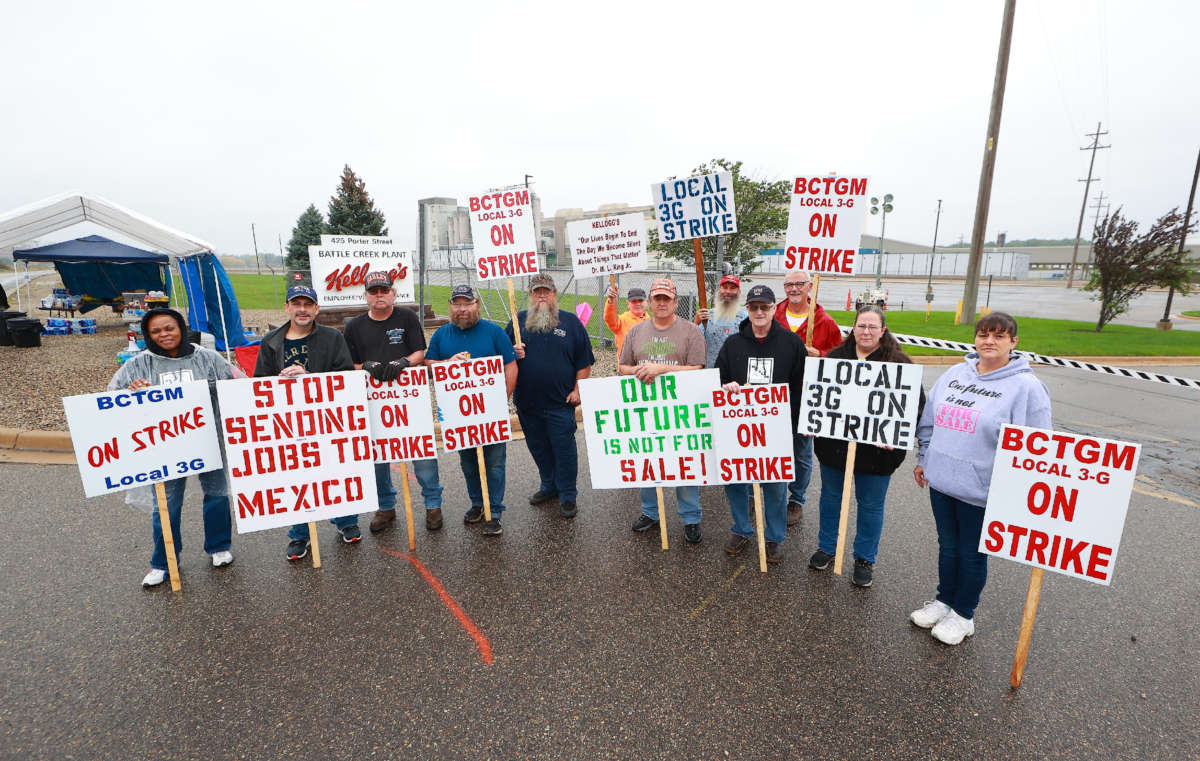Honest, paywall-free news is rare. Please support our boldly independent journalism with a donation of any size.
With 1,400 cereal plant workers in the midst of their 11th week of striking, Kellogg Company says that it has reached a tentative agreement to end the strike. The union is expected to vote on the new agreement by Monday.
The Bakery, Confectionary, Tobacco Workers and Grain Millers International Union has not yet put out a statement about the agreement, and workers rejected a deal just two weeks ago. As the company faces mounting pressure from the public and progressive lawmakers, however, it is hopeful that the new agreement will satisfy the union.
However, the company’s latest offer fails to get rid of a two-tier employee structure that allows the company to pay new workers less and offer fewer benefits. That lower tier currently applies to about 30 percent of employees. Striking workers have said that getting rid of this structure is a top priority for them, and soundly rejected a previous tentative agreement from the company that also failed to remedy this concern.
Shortly after workers struck down that deal, the company made a drastic move: It announced plans to permanently replace the 1,400 striking workers, a move that labor advocates and striking workers said showed the company’s bad faith in negotiations that have been going on for over a year.
Kellogg has been facing a boycott since early October, when workers began striking. This move intensified calls for a boycott and inspired people on the “antiwork” subreddit to flood the company’s online job portal, spamming the website and causing it to crash multiple times, according to users of the forum.
Influential lawmakers have called attention to the company’s union-busting efforts. President Joe Biden condemned the company’s decision to replace striking workers, saying that he was “deeply troubled” by the move and that it is “an existential attack on the union.”
Sen. Bernie Sanders (I-Vermont), meanwhile, is travelling to Battle Creek, Michigan on Friday to rally with the workers and stand up to Kellogg’s “corporate greed.” In October, he led a letter signed by six Democratic senators to Kellogg’s CEO signaling their staunch support of the striking workers.
“Kellogg’s workers made the company BILLIONS during a pandemic by working 12-hour shifts, some for more than 100 days in a row. But Kellogg’s is now choosing corporate greed over the workers they once called ‘heroes,’” Sanders said in a tweet.
Indeed, workers have reported having to work 80-hour weeks with few days off. “We don’t have weekends, really. We just work seven days a week, sometimes 100 to 130 days in a row,” Trevor Bidelman, president of the Battle Creek plant’s local, told The Guardian. “For 28 days, the machines run, then rest three days for cleaning. They don’t even treat us as well as they do their machinery.”
The company has vilified its striking workers, saying their demands for better pay and equal treatment for all employees are unrealistic. However, the company has posted high profits as the pandemic has driven up demand, and the company’s CEO received a massive compensation package of over $11.6 million in the fiscal year ending in 2021. This is 279 times the median employee pay at the company.
A terrifying moment. We appeal for your support.
In the last weeks, we have witnessed an authoritarian assault on communities in Minnesota and across the nation.
The need for truthful, grassroots reporting is urgent at this cataclysmic historical moment. Yet, Trump-aligned billionaires and other allies have taken over many legacy media outlets — the culmination of a decades-long campaign to place control of the narrative into the hands of the political right.
We refuse to let Trump’s blatant propaganda machine go unchecked. Untethered to corporate ownership or advertisers, Truthout remains fearless in our reporting and our determination to use journalism as a tool for justice.
But we need your help just to fund our basic expenses. Over 80 percent of Truthout’s funding comes from small individual donations from our community of readers, and over a third of our total budget is supported by recurring monthly donors.
Truthout has launched a fundraiser to add 379 new monthly donors in the next 6 days. Whether you can make a small monthly donation or a larger one-time gift, Truthout only works with your support.
